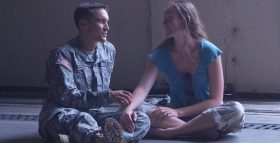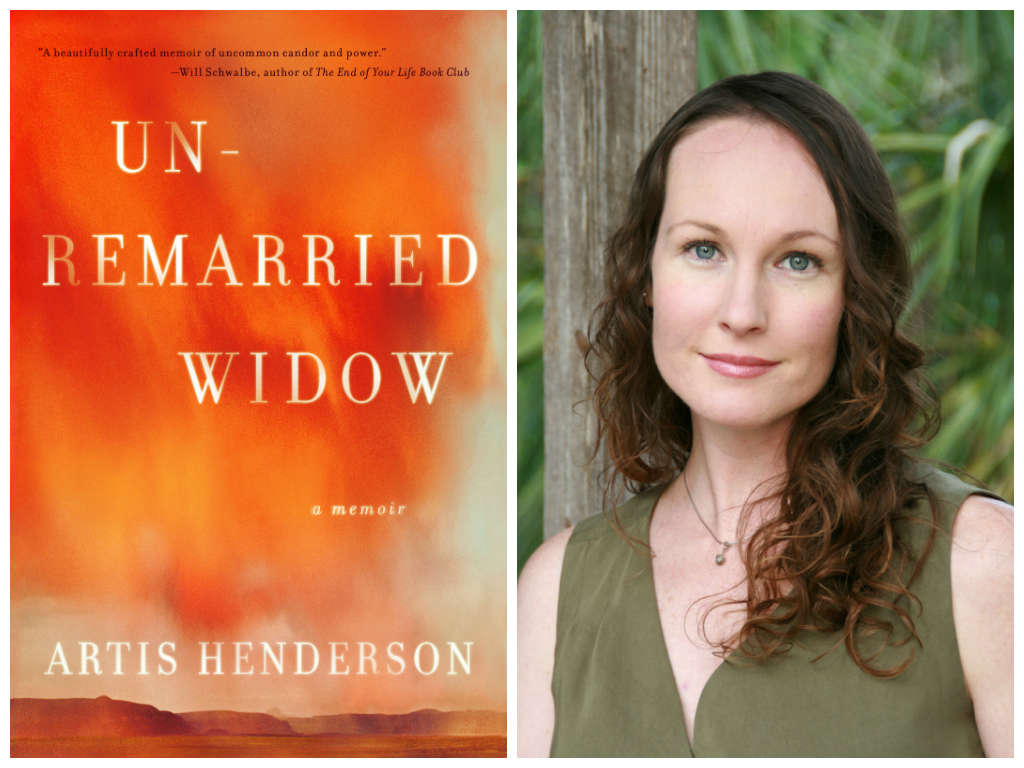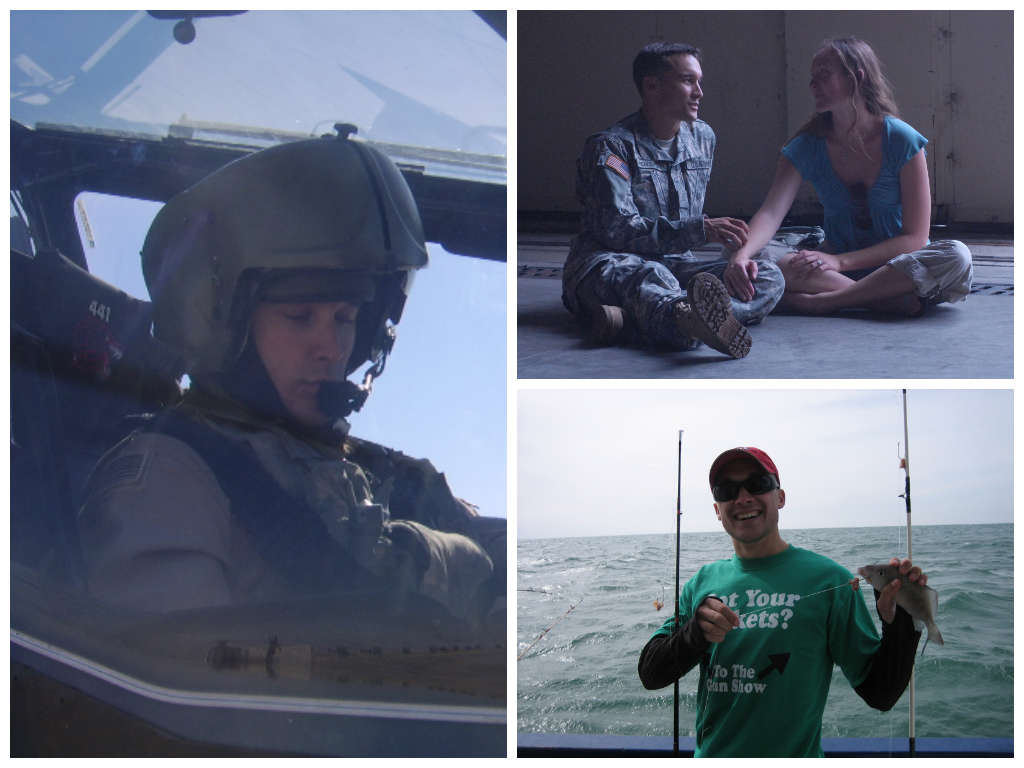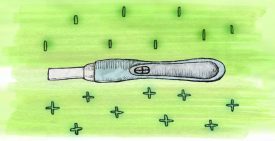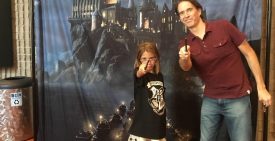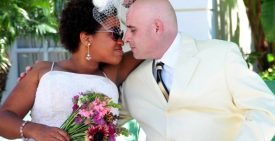There are more than a thousand widows of the wars in Iraq and Afghanistan, but during my first time at the National Military Survivor Seminar held each year over Memorial Day weekend by an organization called Tragedy Assistance Program for Survivors, or TAPS, I worried that none of them would be like me. When I walked into the upstairs lobby of the hotel on the first day, I saw that all of the women seemed to know each other, as if they had come from the same unit. They hugged and cried in small circles, everyone but me in red t-shirts.
“Is this registration?” I asked a woman behind a wooden table.
“Sure is,” she said in a voice that struck me as too high and too light.
“Henderson,” I said as she thumbed through the registration packets.
“Here we go.” She handed an envelope across the table and beamed up at me. “You can pick up your t-shirt over there.”
She pointed across the lobby and I turned in that direction.
“Don’t forget your button,” she called after me.
“My button?”
As I looked at the table next to hers I understood. The TAPS registration form I’d filled out months before had asked me to submit a picture of my loved one. I remembered having sent in a photo of Miles, but I couldn’t have told you which one. I moved to the adjoining table and gave the woman there my name. She handed over a small manilla envelope and I pushed open the brass clasp. Inside was a photo button—Miles on the deck of a deep sea fishing boat, a yellow-finned grunt in his hand. My breath caught in my throat.
“What do I do with this?” I said to the woman behind the table.
“You wear it,” she said. “Like this.”
She took the large manilla envelope out of my hand and dug through the contents until she found a small black pouch with a black nylon cord.
“The string goes around your neck,” she said, “and your button goes right here.”
She lifted the pouch out of my hands and pinned the button to the side.
“Don’t forget your ribbons,” she said.
She pointed to the next table over where colored ribbons lay in neat rows, each with a printed label: Loved One, Sibling, Parent; Marine, Navy, Air Force. I took a green Army ribbon and purple Spouse ribbon. As I pulled the strips of paper off their adhesive backs, I noticed a woman in line behind me. She dropped the black cord of her pouch around her neck.
“Who did you lose?” she asked as she reached around me for a Spouse ribbon.
I was shocked for a moment at the casualness of it, the way this woman I didn’t know could ask me about something I rarely discussed. But I reminded myself that I was at the conference to talk about Miles and to meet other grieving survivors. Otherwise why bother?
“I lost my husband,” I said. “Miles.”
“Can I see?”
The woman pointed to the button hanging on my badge. As I passed the photo to her I realized how young the man in the image was. It occurred to me that some day I will be an old woman carrying a photo of the boy I love.
“He’s cute,” the woman said.
She handed back my button and I smiled despite myself.
“We regret, those of us who have lost a loved one suddenly, that we didn’t have the chance to say goodbye.”
A speaker with soft arms and an expansive bosom, the kind of frame made for hugging, stood at the front of the conference room while I sat at a crowded table draped in white cloth. A woman across from me reached for a box of tissues at the center of the table. It looked like she’d been crying all day.
“We think if we just had one more minute with them, we’d say all the things that didn’t get said.” The presenter moved across the floor as she spoke. “Now this may make some of you sad. And it may make some of you angry. But listen to what I’m going to say. You think if you had another minute, you think if you had more time, you would tell them goodbye. But that’s not what you would say. Here’s what you would say. I love you. And, I’ll miss you. And, Remember that time we— You’d say all that. But Goodbye? Never.”
I scanned the room—the speaker had drawn a packed audience and everyone had the same look, a mix of devastation and hope.
“Now this is blank paper,” the speaker said as she handed out white strips, “don’t write anything on it.”
She stopped beside my table and laid a stack in the middle.
“I mean, I want you to write on it. But let me tell you what it’s got to say first.”
People laughed the way they will when they’re steeling themselves, when they know the hard part’s coming.
“We all have unresolved issues with our loved one,” the speaker said. “It’s the nature of love. We all have issues that we didn’t work out, problems that never got fixed. I want you to think about what that is for you. Go ahead. Take a minute. Close your eyes if you want to.”
I closed mine, weary from looking at all those wrecked faces, and shuffled through what Miles and I had left undone, unsaid.
“Now think of the issue that weighs on you the most,” the speaker said. “What is it you wish you could say to them if you had one last time together? What do you need to apologize for? What do you need to get off your chest?”
I scrolled down the list of things I wished I had done differently. If only I had kept my mouth shut—about the house, about the military, about my worries for the future. If only I had been kinder, gentler. If only I could have brought Miles home.
“Go ahead and open your eyes now,” the speaker said.
The conference room was the same, all broken-hearted parents and sisters and wives. All of us sick with our grief.
“Now what I want you to do with this scrap of paper—” The speaker held up one of the blank sheets in front of her. “I want you to write down what you would say to your loved one.”
I met the eyes of the young woman next to me and we both raised questioning brows.
“I’m going to take the papers—now fold them up good when you get done writing—and I’m going to take them home. I’m not going to look at them. I’m going to burn them and they’ll go up in smoke and that way—now you may believe this, and you may not—but I like to think your loved one will get the message.”
The young woman to my side passed me a pen.
“Take a minute now,” the speaker said. “Don’t rush yourself. Write what you need to write.”
I thought of the fear that I nurse daily, the fear that I sleep with at night and wake to in the morning, the fear I carry like my mother carries her silence, like Teresa carries her blame. I turned the slip of paper over and I picked up the pen.
I’m afraid I didn’t love you enough to save you, I wrote.
The pain that came with it wrung my lungs and seared my eyes. Around the other tables, men and women were also crying. I reread what I had written and for the first time it occurred to me that perhaps my fear was groundless. Of course I loved Miles. In a way that I had previously been unable to see, I realized my love had not factored in his death. There was action and fate and pure dumb luck. There was the absurdity of circumstance, that two good pilots could be brought down by bad weather they had seen coming. There was the reality that sometimes one helicopter goes down and the second one does not. There was the unfairness that sometimes your husband is on the one that goes down.
“Just leave your paper on the side table on your way out,” the speaker said from the front of the room.
I folded mine quickly before anyone could see what I had written, and as I filed out of the room I added my small slip to the others stacked on a table against the wall. Much later I tried to describe the experience of the conference to someone—the photo buttons and the seminars and the crying with strangers—and he said, “That sounds awful.” But it wasn’t awful. It was difficult and painful and terribly, terribly hard. But it was also redemptive, a brush fire to clear the land.
For the TAPS Saturday night banquet, I dressed in a black cotton dress cut low in the front. Too racy for that crowd, I figured, but I wore it anyway. I wondered if there would be dancing. The experience had been so surreal—all that laughter, all that festivity in the midst of overwhelming sadness—that I had ceased being surprised. People milled outside the reception hall in their nice clothes, suddenly strange without their red t-shirts. A few men circulated, fathers and brothers and friends, but the crowd was mostly women. A pretty blond stood to my left and smiled when I glanced over. I smiled back.
“Are you here by yourself?” she said. The woman, who looked my age, stuck out a hand. “I’m Laura.” She turned to the small group beside her. “We’re all wives. I mean, widows.”
I shook each of their hands—Mindi, Jocelyn, Jaime, Sarah—and we fell into a conversation that surprised me with its instant intimacy.
“How long were you married?” Jaime asked.
“Just four months,” I said. “You?”
“Eight years. I met Dave in high school.”
“What branch was your husband in?” Mindi said.
“Army.”
“I’m Army, too. Which unit?”
“The Eighty-Second. Out of Bragg. Yours?”
“The Two-Six Cav out of Hawaii.”
“How did your husbands die?” I asked and was shocked for a moment at my boldness. But they answered without hesitation.
“A Kiowa crash.” Mindi said.
“An IED blast.”
“IED.”
“And yours?” Mindi asked.
“Helicopter crash,” I said.
They nodded, knowing.
“Did you meet before TAPS?” I asked the group.
Laura laughed.
“No, we just met,” she said. “This is our first time here.”
“Me, too,” I said.
The crowd shuffled slowly into the ballroom and our group of widows claimed a table in the back. Sarah bought a bottle of wine. I bought a second. A keynote speaker talked about honor and sacrifice and a woman sang Amazing Grace. Jocelyn, who was only a few weeks in, covered her face with her hands and Sarah wrapped her in her arms. I looked around the table and saw that we were all crying. For the first time in a long time, it felt all right. We ate the baked chicken and asparagus that the waiters served. We drank our cheap hotel wine. At one point Mindi pulled a rose from the arrangement in the middle of the table and soon we each had a flower stuck in the neckline of our dresses.
“Our bereavage,” she called it.
There was no dancing, as it turned out, just a slow end to the evening. I laughed in a way I had not laughed since Miles died. As we headed out of the ball room and to our separate hotel suites, I wondered why I hadn’t known women like them before. Where had they been when I was trying to make a life alongside the military?
The answer, of course, is that they had been there all along.
On the morning of Memorial Day, TAPS arranged a shuttle from the hotel to Arlington National Cemetery and our small group joined up at Section 60. We followed Mindi to her husband Tuc’s grave and fanned around her on the grass. We sat for a time without talking and then in the way of military widows we talked about the grim details of our husbands’ deaths. This was the new language I had learned to speak, a lexicon of briefings and autopsy reports and partial remains.
“You said Tuc died in a helicopter crash?” Sarah asked.
“Yeah,” Mindi said. “They got shot and went down hard.”
“Did you get to see him after he came back?”
“In the funeral home.”
I sat back on the grass. “You saw him?”
“Just from the waist up. In the coffin.”
“How was he?”
“He looked all right.”
“I saw Sean,” Laura said. “As soon as they got him to the funeral home.”
“What was it like?” I said. “To see him, I mean.”
“Not too bad. I got to hold his hand.”
“How was it?”
“He was cold,” Laura said. “They pack them in ice.”
I imagined Miles’ body gone stiff and cool, and I shivered. Other families had started to fill the cemetery and a group of young men smoked cigars a few graves down. They brought folding chairs and a cooler of beer, as if they planned to be there all day.
“I didn’t see Dave,” Jaime said. “The IED blew apart his Humvee. I don’t want—”
She looked at her feet and back at us, and we returned her look without flinching.
“I don’t want to think about how he came home.”
I ran my hand over the grass and felt the day’s heat gathered there. To the east the brown waters of the Potomac churned toward the sea and I thought of rivers running red with blood. At Arlington the grave markers are white like ivory or bone or teeth. I looked at the young women beside me and considered the terrible knowledge they carry inside them, knowledge I carry too, and I felt a sudden responsibility to tell their stories, our stories. I wanted everyone to know the things we knew.
From “UNREMARRIED WIDOW” by Artis Henderson. Copyright © 2013 by Artis Henderson. Reprinted by permission of Simon & Schuster, Inc. All rights reserved.

